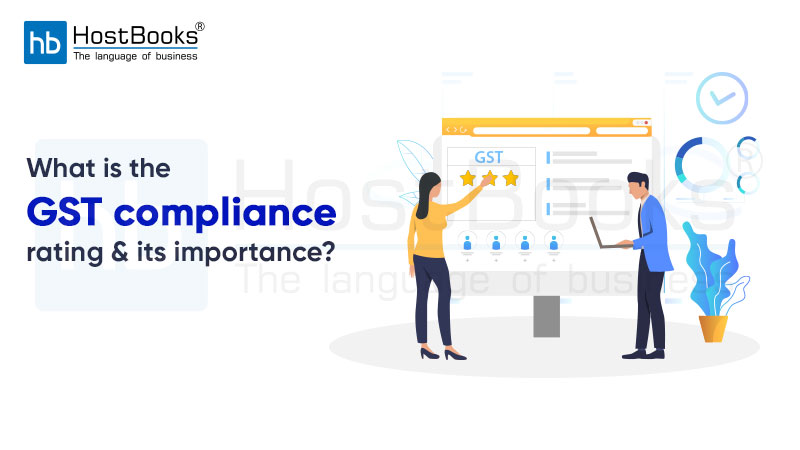What is the GST Compliance Rating & its Importance

All taxpayers registered under Goods and Services Tax (GST) must comply with its rules and regulations. To monitor how compliant businesses are with the GST regulations, the government has introduced the GST compliance rating wherein taxpayers are given a compliance rating score. The compliance rating can have a wider impact, affecting everything from your tax refunds to partnering with suppliers. The primary motive behind introducing the GST compliance rating is to encourage taxpayers to be compliant and file GST returns on time.
The score in the GST compliance rating ranges from a scale of zero to 10, with 10 being the best and zero being the worst. According to the GST Act, the government can assign a score to anyone who is registered under GST. According to the GST Network (GSTN) CEO Prakash Kumar, every taxpayer will start from a level-playing field and from thereon will be rated based on their GST compliance over time. There are multiple factors on which businesses will be rated. Let’s explore that next.
What factors will impact your compliance rating?
Make tax payments on time
After being registered under GST, you are required to pay taxes that you are liable for. Some of the elements taken into account include how early one is paying taxes and/or if there is any delay in tax payment. For instance, if you are not paying taxes in time, it could affect your compliance score. This would reflect that you are efficient in complying with GST rules and regulations, thus, impacting the image of your business.
Cooperating with GST authorities
The tax authorities may visit the place of your business to verify your physical address. In other cases, you might have to interact with the tax officials or respond to clarifications sought by the GST authorities. Hence, cooperation with the tax officials is of utmost importance as you might be rated on how you respond to their queries.
Filing your GST returns on time
On-time and correct filing of GST returns is one of the significant factors impacting your GST compliance rating. Filing your GST returns on time not only positively improve your compliance rating, but it also helps you to avail input tax credit (ITC). In addition to affecting your compliance score, delay in filing returns can result in delayed ITC and subsequently impact your working capital.
Reconciliation on time
To avail the tax credit and file your GST returns correctly, it is important that you and your supplier file GSTR-1 and GSTR-3B respectively and the transactions of both the forms should match. Unless the details are not reconciled correctly, the tax return cannot be filed which will delay the filing of returns and other related processes.
And reconcile your purchases with GSTR-2A auto populated from supplier’s GSTR-1 filed on GST portal.
Fixing any errors in your returns on time
Notes:
Since the GST system is online and the ratings are expected to be generated automatically, it’s important to stay current with your taxes. A single return filed late has the potential to affect your score rating. However, the government also understands that problems and delays within the GST system (Issue in GST portal) is not your fault — which means that your score should not be affected if the GST portal goes down and prevents you from filing on time.
As a small business owner, your company’s good GST compliance rating can be a big benefit. When you file and pay on time, you can maintain a high score that improves your tax status and leads to valuable professional partnerships.
Why maintaining a high compliance score is important?
Complying with various regulations may seem confusing but it ensures that your compliance rating score is at its best. The compliance score can impact how other businesses and the suppliers interact with an entity as it is publicly available on the GST portal. The following are some of the benefits of having a good compliance rating.
- Being compliant and a higher score will significantly reduce the chances of scrutiny audits from GST officials of your business. If you consistently maintain a higher rating, it indicates that you are running your business by following all the rules and regulations. On the other hand, a low rating leads to frequent audits, and the more GST authorities are at the place of your business, the more negative impact it will have on your business’s image.
- If you maintain a high compliance score, your business will have a positive impression in the GST ecosystem, resulting in speedy credit of refund claims. The higher rating also means that your business is stable and is excellent in its dealings. This will enable your business to have a positive image among your clients and suppliers.
- Normally, people trust businesses that are compliant with the existing rules and regulations, meaning more growth for your business. With every taxpayer having the ability to view an entity’s compliance rating, a higher score means more opportunities for your business. This might also help you to have a competitive advantage over other businesses that are dealing in the same industry.
As GST compliance rating can affect your business’s standing in multiple ways, it is important to closely observe the factors that affect your compliance. Most importantly, make sure that you filing your GST returns and making tax payments in time. To ease your compliance burden, you can use automated GST compliance software that helps to timely file your GST returns.

Try HostBooks
SuperApp Today
Create a free account to get access and start
creating something amazing right now!














